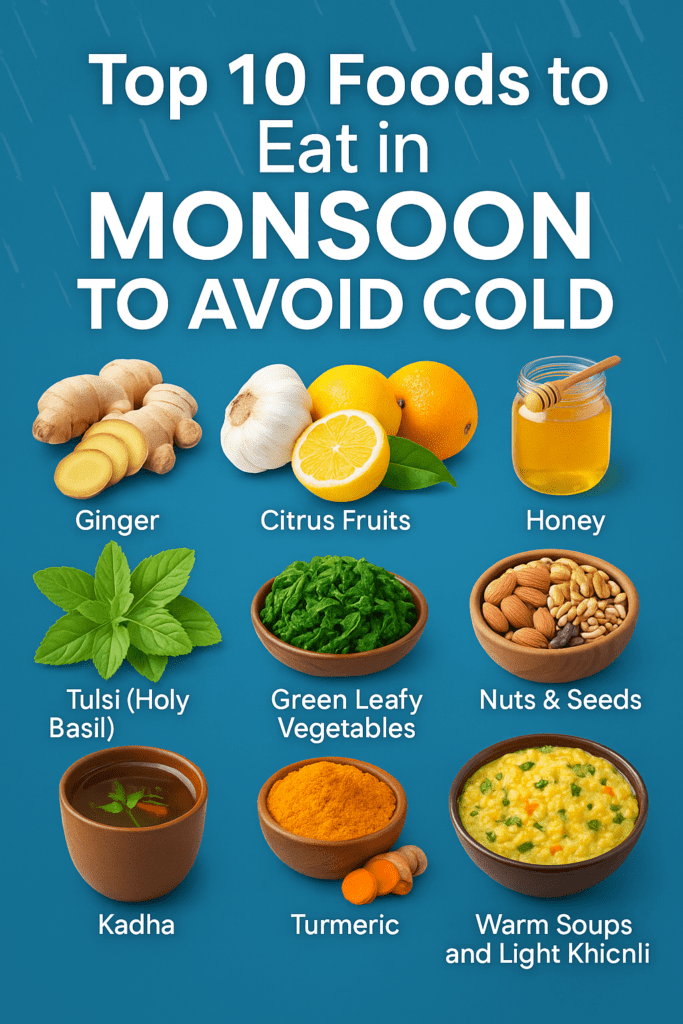🌧️ Top 10 Foods to Eat in Monsoon to Avoid Cold
Introduction
The monsoon season in India brings soothing rains, lush greenery, and a welcome relief from the scorching summer. But it also comes with a downside — increased vulnerability to infections, especially the common cold, flu, sinusitis, respiratory problems, and digestive issues.
The high humidity levels, fluctuating temperatures, and exposure to contaminated water or food make our immune systems more susceptible. Thus, it becomes essential to consume foods that support immunity, fight pathogens, and keep the body warm and nourished.
This article presents the top 10 monsoon-friendly foods to include in your diet to prevent cold and other seasonal illnesses. Each item is explained in detail, including its nutritional value, benefits, and ways to consume.

🫚 1. Ginger (Adrak)
🌟 Key Benefits:
- Anti-inflammatory: Reduces throat inflammation and nasal congestion.
- Antimicrobial: Fights viruses and bacteria causing cold.
- Thermogenic: Increases body temperature and boosts metabolism.
- Digestive aid: Prevents bloating and indigestion, common in monsoon.
🧪 Nutritional Content (Per 100g):
- Calories: 80 kcal
- Vitamin C, B6
- Magnesium, Potassium, Manganese
💡 How to Include:
- Ginger Tea: Boil crushed ginger in water, add lemon and honey.
- Raw ginger: Chew with rock salt after meals.
- Soups & Curries: Add grated ginger for flavor and health benefits.
🧄 2. Garlic (Lahsun)
🌟 Key Benefits:
- Rich in allicin, a compound that exhibits antiviral and antibacterial properties.
- Stimulates the immune system and improves white blood cell activity.
- Helps in thinning mucus, relieving blocked sinuses.
🧪 Nutritional Content (Per 100g):
- Calories: 149 kcal
- Vitamin C, B6
- Selenium, Manganese
💡 How to Include:
- Roast garlic pods and eat on empty stomach.
- Add finely chopped garlic in dals, stir-fried veggies.
- Make garlic chutney or garlic rasam during cold spells.
Tip: For best medicinal effect, crush garlic and let it sit for 10 minutes before cooking. This activates allicin.
🍋 3. Citrus Fruits (Lemon, Orange, Sweet Lime)
🌟 Key Benefits:
- Excellent source of Vitamin C, which boosts immunity and reduces cold duration.
- Acts as antioxidants, preventing cellular damage.
- Improves iron absorption, which is vital during seasonal fatigue.
🧪 Nutritional Content (Per 100g – Orange):
- Calories: 47 kcal
- Vitamin C: 53.2 mg (89% RDA)
- Folate, Potassium
💡 How to Include:
- Drink warm lemon water with honey on an empty stomach.
- Eat whole fruits instead of juice to retain fiber.
- Make a salad with citrus fruits and mint.
Avoid street-vendor juices or pre-cut fruits in monsoon due to contamination risks.
🍯 4. Honey (Shahad)
🌟 Key Benefits:
- Natural cough suppressant; coats and soothes the throat.
- Possesses antibacterial, antiviral, and antioxidant properties.
- Helps reduce cold symptoms and provides a quick energy boost.
🧪 Nutritional Content (Per Tbsp):
- Calories: 64 kcal
- Natural sugars: fructose & glucose
- Trace enzymes and polyphenols
💡 How to Include:
- Mix in warm water with lemon every morning.
- Add to ginger tea, herbal kadha, or turmeric milk.
- Use as a natural sweetener in oats or muesli.
Never boil honey — high heat destroys its enzymes and nutrients.
🌿 5. Tulsi (Holy Basil)
🌟 Key Benefits:
- Possesses immunomodulatory, antiviral, and anti-allergic effects.
- Relieves cold, cough, bronchitis, and even asthma symptoms.
- Acts as a natural expectorant — clears mucus from lungs and nasal passages.
🧪 Nutritional Content (Per 100g):
- Vitamin A, C
- Iron, Calcium
- Eugenol (anti-inflammatory compound)
💡 How to Include:
- Boil 5-6 tulsi leaves in water to make a tulsi tea.
- Add fresh leaves to kadha, soups, or herbal decoctions.
- Chew 4–5 fresh leaves every morning on an empty stomach.
Tulsi is best consumed fresh; avoid drying or storing for long periods.
🥬 6. Cooked Green Leafy Vegetables
🌟 Key Benefits:
- Provide essential nutrients like iron, vitamin A, C, and fiber.
- Help detoxify the body and improve resistance to infections.
- Reduce oxidative stress and support blood cell production.
Raw leafy greens can harbor pathogens in monsoon. Always wash thoroughly and cook well.
🧪 Nutritional Highlights:
- Spinach (Palak): Iron, Folate, Vitamin K
- Methi (Fenugreek): Vitamin C, Calcium
- Dill leaves (Shepu): Antioxidants, Flavonoids
💡 How to Include:
- Add to soups or cook with moong dal.
- Methi paratha or palak thepla for breakfast.
- Palak paneer or spinach khichdi for lunch.
🟡 7. Turmeric (Haldi)
🌟 Key Benefits:
- Contains curcumin, a compound known for anti-inflammatory, antiviral, and antibacterial action.
- Helps fight infections and boosts overall immunity.
- Enhances liver function and reduces inflammation during cold and flu.
🧪 Nutritional Content (Per 100g):
- Curcumin: 3–5%
- Iron, Potassium
- Essential oils
💡 How to Include:
- Golden Milk: Add ½ tsp turmeric + pinch of black pepper to warm milk.
- Use in all curries and stews.
- Turmeric tea with ginger, cinnamon, and honey.
Black pepper enhances curcumin absorption by 2000%.
🥜 8. Nuts and Seeds
🌟 Key Benefits:
- Rich in Vitamin E, omega-3 fatty acids, zinc, and selenium — all immune boosters.
- Provide healthy fats that support lung function and skin health during monsoon.
- Offer satiety and prevent sugar cravings during gloomy weather.
🧪 Nutritional Highlights (Per 28g):
- Almonds: Vitamin E (7.3 mg), Protein
- Walnuts: Omega-3s (2.5 g)
- Flaxseeds: Lignans, ALA, Fiber
💡 How to Include:
- Soak almonds overnight and eat in the morning.
- Add crushed walnuts and flaxseeds to oatmeal.
- Make nut-and-seed energy balls.
🍵 9. Herbal Kadha
🌟 Key Benefits:
- Traditional Ayurvedic remedy to fight cold, cough, and flu.
- Made with herbs and spices that strengthen immunity, warm the body, and clear respiratory passages.
- Acts as a detox drink and improves digestion.
🔬 Common Ingredients:
- Tulsi
- Ginger
- Black pepper
- Clove
- Cinnamon
- Mulethi (optional)
💡 How to Prepare:
- Boil ingredients in 2 cups of water for 10–15 minutes.
- Add honey and sip warm.
- Take once daily or twice during active cold symptoms.
🍚 10. Warm Soups and Khichdi
🌟 Key Benefits:
- Easy to digest and nourishing — ideal when immunity is low.
- Keeps body warm and hydrated.
- Supports gut health, which is directly linked to immunity.
Nutritional Highlights:
- Moong dal: Protein, Iron
- Rice: Carbs for energy
- Veggies: Vitamins and minerals
💡 How to Include:
- Moong dal khichdi with turmeric and ghee
- Clear vegetable soup with garlic and pepper
- Chicken soup or broth (for non-vegetarians)
Avoid heavy meals during monsoon; stick to light and warm foods.
⚠️ Foods to Avoid During Monsoon
| ❌ Food | 🚫 Reason |
|---|---|
| Raw salads | May carry pathogens from contaminated water |
| Street food (chaat, juices) | Prone to bacterial infection |
| Ice creams, cold drinks | Suppress immunity and aggravate cold |
| Fermented foods | Can upset digestion |
| Excess sugar | Lowers white blood cell function |
✅ Additional Tips for Monsoon Health
- 🧼 Wash hands and produce thoroughly
- 💧 Drink only boiled or filtered water
- 🧥 Wear dry, warm clothes and avoid getting drenched
- 😴 Get 7–8 hours of sleep to support immune function
- 🚶♂️ Light indoor exercises to stay active
🧠 Conclusion
The monsoon is a season of transformation — both in nature and within us. While it refreshes the earth, it can test our body’s defenses. The right food choices can go a long way in helping you stay healthy, prevent seasonal cold, and boost your immunity naturally.
By incorporating these top 10 immunity-boosting foods, and avoiding common dietary pitfalls, you can enjoy the rains without worrying about the sniffles!
Frequently asked questions
1. What foods help prevent cold and flu during the monsoon?
Answer:
Foods like ginger, garlic, turmeric, citrus fruits, honey, tulsi (holy basil), and green leafy vegetables help strengthen the immune system and fight cold and flu during monsoon. These foods have natural antiviral, antibacterial, and anti-inflammatory properties that protect against seasonal infections.
2. Can turmeric help prevent colds in the rainy season?
Answer:
Yes, turmeric is highly effective in preventing colds due to its active compound curcumin, which has strong anti-inflammatory and immune-boosting properties. Drinking warm turmeric milk or turmeric tea daily in monsoon can help ward off infections.
3. Is it safe to eat leafy vegetables during monsoon?
Answer:
Yes, leafy vegetables are safe and beneficial during monsoon if they are washed thoroughly and cooked well. They are rich in iron, vitamins A and C, and antioxidants, which support immunity. Avoid consuming raw greens in monsoon as they may harbor bacteria due to humidity and contaminated water.
4. How does ginger help in monsoon health care?
Answer:
Ginger helps in monsoon by relieving nasal congestion, soothing sore throat, and enhancing digestion, which tends to weaken during rainy weather. Its antimicrobial and warming properties make it an excellent natural remedy to prevent and treat colds and flu.
5. Can honey reduce cold symptoms during rainy weather?
Answer:
Yes, honey acts as a natural cough suppressant and throat soother. It also has antibacterial and antioxidant properties that boost immunity. Consuming honey with warm water, lemon, or ginger tea can significantly reduce cold symptoms in monsoon.
6. What is the best immune-boosting drink in monsoon?
Answer:
Herbal kadha is one of the best immune-boosting drinks in monsoon. Made with ingredients like tulsi, ginger, black pepper, cinnamon, and honey, it helps prevent cold and supports respiratory health. Drinking kadha 2–3 times a week keeps the immune system strong.
7. Why should you avoid cold or street foods during the monsoon?
Answer:
Street foods and cold items like ice creams or chilled beverages can suppress the immune system and increase the risk of infections, especially during monsoon. These foods are often prepared in unhygienic conditions and may contain bacteria due to high humidity, leading to colds, flu, or stomach infections.
For more regular updates you can visit our social media accounts,
Instagram: Follow us
Facebook: Follow us
WhatsApp: Join us
Telegram: Join us



